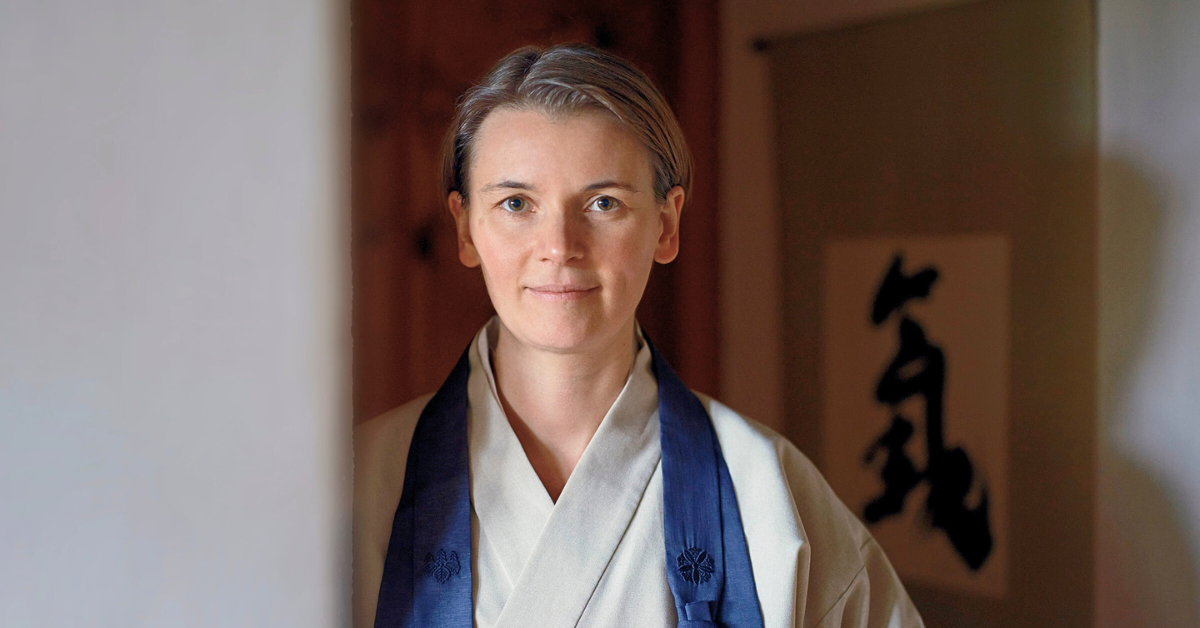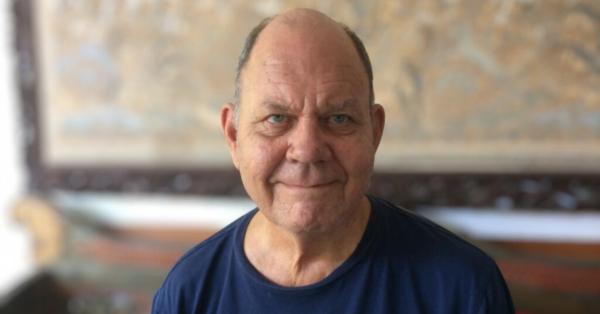
Photo by Jürgen Frank
By Tova Green
Tatsudo Nicole Baden recently spoke with me about her path to Zen, her initial meeting with Richard Baker Roshi, and what her focus is now as a Zen teacher and Abbot. She will be giving a Dharma talk at City Center on May 14 and at Green Gulch on May 18; both talks will also be livestreamed.
Nicole is the Abbot of the international non-profit organization Dharma Sangha and its two Zen Practice Centers, the Crestone Mountain Zen Center in Colorado, USA and the Zen Buddhist Center in the Black Forest, Germany. Nicole is a Dharma successor of Zentatsu Baker Roshi, SFZC’s second Abbot from 1971–1983, in the Soto Zen Lineage of Shunryu Suzuki Roshi. She has been practicing Zen since 2001 and received Dharma Transmission in 2017.
“I started to inquire when I was sixteen, a couple of years before I began to practice. For a German student, those high school years are when one starts choosing courses that point to one’s life path; it’s a decisive time. I realized that I had no idea of what I wanted to do. I wondered, ‘Who is that me that could want anything?’ My sense of myself was entirely based on what others thought about me and whether they would like me. I had a ‘third person me’, not a ‘first person me.’ I had no tools to change that; I didn’t have the mental furniture. I didn’t really know how to ‘inhabit’ my life.”
Nicole grew up in a Protestant, Christian family. “I read the Bible. I couldn’t find views or beliefs that helped. I spoke with adults and couldn’t find anyone who could relate to my experience. They often reflected back to me that I was selfish because I had this inquiry. When I told my parents, my dad said, ‘I don’t understand why you are suffering so much. Can’t you just enjoy life?’ He had a colleague who had spoken to him about selbstfindung (finding oneself). This man had visited contemplative places and brought over twenty brochures he gave to my father. My father offered, as a gift for my eighteenth birthday, to pay for my participation in a program at any of those places and to drive me to the place of my choice.
“I looked at the colorful brochures and had no idea how to choose one. I closed my eyes and held one up. It was the only brochure that was black and white. It was from the Buddhist Center called Johanneshof and gave the names and dates of several retreats. I chose the one that coincided with my Easter vacation and went there for two work weeks.
“At Johanneshof what stood out for me was zazen. I didn’t know how to sit and it was very painful. However, I was thrown back into myself, profoundly left alone. For the first time I experienced space within myself. I could just be there. They just asked me to sit still. I felt that I was coming home to my life. I could feel the floor beneath my feet. I felt the breath and the space. I basically decided during my first zazen period that this is what I wanted to do for the rest of my life.
“I felt a resonance with the people at Johanneshof. They were the first people who understood me. A nun who lived there, Gisela, encouraged me to continue my inquiries. She validated them. That meant a lot to me.
“After returning home I meditated before going to school every morning. I learned the power of giving myself space. I decided to take a year off to travel after finishing high school. I began the year at Johanneshof, returning there in the summer. Richard Baker Roshi was there. One day, I saw a tall guy with a shaved head come down the stairs. He said “You must be Nicole. I’m Richard.”
Richard Baker invited Nicole to attend a seminar in Muenster, a six-hour drive north. “I said no, because I had agreed to help Gisela remove snails from plants in the garden—and at that time, that seemed more important to me. But Gisela encouraged me to go. I went with Richard and his family to Muenster. I was able to ask him questions. I began to understand that Johanneshof was more than zazen, work, and the people. I decided to stay at Johanneshof for the entire year and learn more about the teachings. I began to understand that it was a path.
“After I had sat several sesshins, Richard invited me to go to Crestone Mountain Zen Center in Colorado for a practice period, which was led by Dan Welch. It was such an intense time. The schedule was tough; we got up at 3:30 every morning. It was difficult physically, mentally, and emotionally. Nevertheless, it had such a profound impact on me, that my intention to practice deepened. So, I felt I had to develop a life around Zen practice. I wanted to have some professional training and still practice Zen, so. I went to Oldenburg University to study psychology. After I graduated I returned to Crestone for four years.”
In 2010 Nicole received priest ordination. At this time, Baker Roshi gave her the Buddhist name Tendo, which means “Unfolding the Way.” During the following years, she says, the focus of her practice shifted significantly. She felt that her sense of herself—and of her practice—became more inclusive. “When I first started practicing, it was basically an attempt to help myself. To figure out how to deal with the psychological suffering I was experiencing. How to deal with the ways I didn’t really ‘fit into’ my surroundings. But at some point, I realized, ‘I am okay now.’ A basic ‘okayness’ was always present. At that point, I started to feel more and more that I was participating in sustaining our Practice Centers, because I wanted them to exist in this world. I wanted other people to have access to these wisdom teachings and crafts as well.”
In 2018, Nicole received Dharma Transmission from Baker Roshi. At this point, he changed her Buddhist name from Tendo to Tatsudo, which means “Penetrating the Way.” When asked what practice is about for her today, she cites three questions:
- How do we deal with dukkha (a Pali word often translated as suffering, pain, or unsatisfactoriness) and be happy in the midst of uncertainty?
- What kind of knowledge can we trust?
- How should we live from moment to moment; what is right conduct?
“I enjoy working with people who seek, no matter their age, nationality, or gender. We are seeking together.”
In September 2024, Richard Baker Roshi stepped down as Abbot of Johanneshof and Crestone Mountain Zen Center, and Nicole became his successor as Abbot via a Mountain Seat Ceremony. Before the ceremony, Nicole thought it was merely a formality, as she had basically run the Center in Germany for a long time. However, due to the attentive training provided by Victoria Austin from San Francisco Zen Center and Shungo Suzuki, the grandson of Shunryu Suzuki Roshi, “a chemistry was created that made the whole ceremony a journey. I had to grow into it. I now feel in my body the presence of lineage in a different way. There is a profound groundlessness that comes with a particular role.
“I feel gratitude all the time, full of good wishes for the world. The world needs people who believe that ‘the world could be otherwise’ (the title of a book by Zen teacher Norman Fischer).”
Abbot Nicole and Richard Baker Roshi will be coming to City Center and Green Gulch Farm May 14–18, where each of them will be giving Dharma talks. (The talks will also be available online. See Calendar for details.)
Nicole referred to a visit the two of them made to SFZC in 2023, which began to shift the perspective of some SFZC elders regarding pain from the 80s when Baker Roshi was the Abbot: “We can look at the present moment from the perspective of the past, or we can look at it from the perspective of the future. The question becomes, ‘Who will we have become?’ We can shape the present from the perspective of the future we want.”
They will also be leading a free online weekend presentation, “Engaging the Heart of Wisdom” from May 23–25. There will be many voices expressing wisdom and compassion. For more information, see this webpage.











